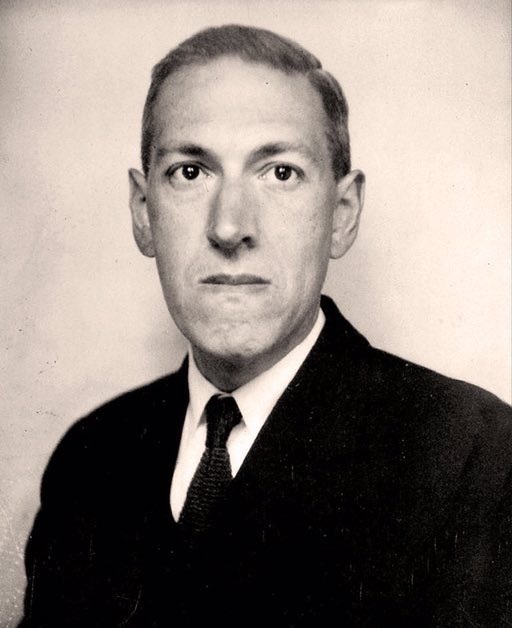„Nešťastný je ten koho spomienky sú naplnené iba hrôzou a smútkom.“
poviedka: Vydedenec,The Outsider
Potvrdené výroky
Howard Phillips Lovecraft bol americký autor sci-fi, fantasy a hororov.

„Nešťastný je ten koho spomienky sú naplnené iba hrôzou a smútkom.“
poviedka: Vydedenec,The Outsider
Potvrdené výroky
„Čo vo večnosti leží mŕtve nie je, v záhade vekov sa i smrť vo smrť navždy zmení.“
iný preklad: Nie je mŕtve to čo môže večne dumať a po zvláštnych érach aj smrť môže skonať.
iný preklad: Nie vždy je mŕtve to, čo nekonečné veky leží nehybne, a v podivných vekoch vekov ani len smrť sa smrti nevyhne.
poviedka: Volanie Cthulhu
Potvrdené výroky
poviedka: Vydedenec,The Outsider
Potvrdené výroky
poviedka: Vydedenec,The Outsider
Potvrdené výroky
poviedka: Tá vec na prahu
Potvrdené výroky
„Spomienky si uchovávajú výlučne chudí a osamelí“
poviedka: Slávnosť
Potvrdené výroky
„Ale vo vesmíre nájdeme balzam rovnako ako horkosť. A tým balzamom je zabudnutie.“
poviedka: Vydedenec,The Outsider
Potvrdené výroky
Fiction, The Call of Cthulhu (1926)
Fiction, The Call of Cthulhu (1926)
Letter to August Derleth (16 May 1931), responding to Derleth's suggestion that he call the interconnected mythology of his stories (what would later be known as the Cthulhu Mythos) "The Mythology of Hastur", quoted in "H.P. Lovecraft, a Life" by S.T. Joshi, p. 505
Non-Fiction, Letters, to August Derleth
Letter to a round-robin letter-writing group called "the Coryciani" (14 July 1936), quoted in Lord of a Visible World: An Autobiography in Letters edited by S.T. Joshi, p. 339
Non-Fiction, Letters
Letter to James F. Morton (18 January 1931), quoted in "H.P. Lovecraft, a Life" by S.T. Joshi, p. 587
Non-Fiction, Letters, to James Ferdinand Morton, Jr.
Letter to Robert E. Howard (16 August 1932), in Selected Letters 1932-1934 edited by August Derleth and Donald Wandrei, p. 57
Non-Fiction, Letters
Fiction, The Call of Cthulhu (1926)
Letter to "The Keicomolo"—Kleiner, Cole, and Moe (October 1916), in Selected Letters I, 1911-1924 edited by August Derleth and Donald Wandrei, p. 27
Non-Fiction, Letters
Letter to Elizabeth Toldridge (8 March 1929), in Selected Letters II, 1925-1929 edited by August Derleth and Donald Wandrei, p. 316
Non-Fiction, Letters
Letter to Reinhardt Kleiner (14 September 1919), in Selected Letters I, 1911-1924 edited by August Derleth and Donald Wandrei, pp. 86-87
Non-Fiction, Letters
Letter to Elizabeth Toldridge (8 March 1929), in Selected Letters II, 1925-1929 edited by August Derleth and Donald Wandrei, pp. 316-317
Non-Fiction, Letters
Fiction, The Whisperer in Darkness (1931)
"He" - Written 11 August 1925; first published in Weird Tales, Vol. 8, No. 3 (September 1926)
Fiction
Fiction, The Call of Cthulhu (1926)
Letter to James F. Morton (16 May 1926), quoted in Lord of a Visible World: An Autobiography in Letters edited by S. T. Joshi, p. 192
Non-Fiction, Letters, to James Ferdinand Morton, Jr.
"The Street" - first published in The Wolverine, No. 8 (December 1920)
Fiction
Fiction, The Call of Cthulhu (1926)
At the Root (1918)
Non-Fiction
Letter to Lillian D. Clark (29 March 1926), quoted in Lord of a Visible World: An Autobiography in Letters edited by S. T. Joshi, p. 186
Non-Fiction, Letters
Fiction, The Crawling Chaos (1921)
Letter to Virgil Finlay (25 September 1936), in Selected Letters V, 1934-1937 edited by August Derleth and Donald Wandrei, p. 310
Non-Fiction, Letters
Letter to Frank Belknap Long (3 May 1923), published in Selected Letters Vol. I (1965), p. 227
Non-Fiction, Letters, to Frank Belknap Long
Fiction, The Colour Out of Space (1927)
Letter to James F. Morton (January 1931), in Selected Letters III, 1929-1931 edited by August Derleth and Donald Wandrei, p. 253
Non-Fiction, Letters, to James Ferdinand Morton, Jr.
Letter to James F. Morton (10 February 1923), published in Selected Letters Vol. I (1965), p. 208
Non-Fiction, Letters, to James Ferdinand Morton, Jr.
Letter to Clark Ashton Smith (28 October 1934), in Selected Letters V, 1934-1937 edited by August Derleth and Donald Wandrei, p. 64
Non-Fiction, Letters
.
Fiction, The Call of Cthulhu (1926)